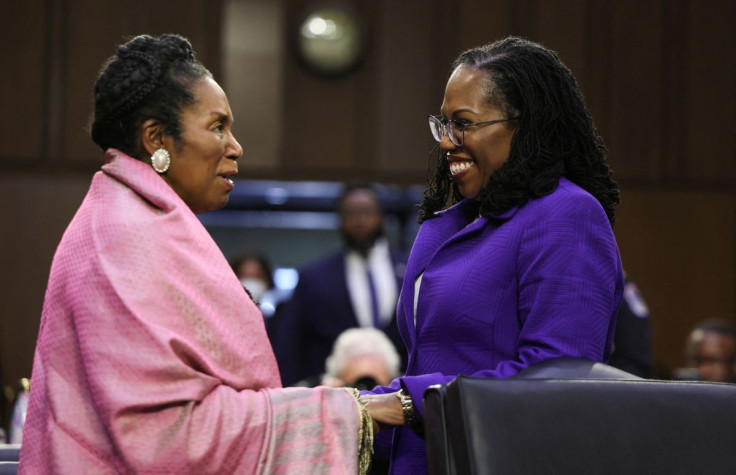U.S. Supreme Court Pick Jackson Defends Representing Guantanamo Detainees

Ketanji Brown Jackson, President Joe Biden's U.S. Supreme Court nominee, on Tuesday defended her past legal representation of Guantanamo Bay detainees, rejected Republican accusations that she had been lenient as a judge in child pornography cases and vowed to "stay in my lane" if confirmed to the lifetime job.
During the second day of her Senate Judiciary Committee confirmation hearing, Jackson pledged to be an independent jurist who would not inject her own views into rulings.
In responding to Republican claims that she has been soft on child pornography defendants, Jackson said: "As a mother and a judge who has had to deal with these cases, I was thinking that nothing could be further from the truth." In each such case, she said, "I did my duty to hold the defendants accountable."
Jackson also said her past legal representation of detainees at the U.S. naval base at Guantanamo Bay, Cuba, was consistent with American values of fairness.
Nominated by Biden in February to become the first Black woman to serve on the nation's top judicial body, Jackson has served since last year as a federal appellate judge after eight years as a federal district court judge.
Jackson said she has received messages from girls around the country saying her nomination has made them think about the law in new ways "because I am a woman and a Black woman."
"We want, I think, as a country for everyone to believe that they can do things like sit on the Supreme Court," Jackson told Democratic Senator Dianne Feinstein. "And so having meaningful numbers of women and people of color, I think, matters. I also think it supports public confidence in the judiciary when you have different people because we have such a diverse society."
Jackson outlined her judicial philosophy, saying she has developed a methodology that allows to her rule impartially.
"I'm acutely aware that as a judge in our system I have limited power and I try to stay in my lane," Jackson told Democratic Senator Dick Durbin, the committee's chairman.
Her confirmation would not change the court's ideological balance - it has a 6-3 conservative majority - but would let Biden freshen its liberal bloc with a justice young enough - age 51 - to serve for decades.
'POLICY QUESTION'
Jackson declined to weigh in on calls from some on the left to expand the court's number of justices to erase its current conservative majority, calling it "a policy question for Congress." Justice Amy Coney Barrett in her 2020 confirmation hearing also declined to opine on the issue.
Republican Senator Josh Hawley has criticized Jackson's record of what he called "lenient" sentences as a trial judge in child pornography cases, below recommendations in federal sentencing guidelines. Republican Senator Ted Cruz accused Jackson of "a record of activism and advocacy as it concerns sexual predators" dating back to her time in law school in 1996 when she wrote a paper discussing sexual offender registries.
Jackson rejected Cruz's characterization, saying "those are not the sentiments I expressed." On the child pornography issue, Jackson called cases involving sex crimes against children harrowing, adding: "These are the cases that wake you up and night because you are seeing the worst of humanity."
Federal judges routinely impose penalties below advisory guidelines in cases involving defendants who do not themselves produce child pornography, according to the U.S. Sentencing Commission, which has urged Congress to address inconsistencies resulting in penalties sometimes too lenient and sometimes too severe.
Sentencing experts in a March 20 letter to the committee deemed Jackson's sentencing in such cases "squarely within the mainstream of federal district court judges nationally."
Jackson worked from 2005 to 2007 as a court-appointed lawyer paid by the government to represent criminal defendants who could not afford counsel, including four Guantanamo detainees. She later continued representing one of the detainees in private practice.
Some Republicans have criticized Jackson for representing these detainees. Republican Senator John Cornyn appeared to catch Jackson off-guard by saying she had called former President George W. Bush a war criminal in court filings in which detainees alleged torture and inhumane treatment.
"Why would you do something like that? It seems so out of character," Cornyn asked her.
The filings said actions by Bush and former Defense Secretary Donald Rumsfeld in directing or conspiring to bring about torture and other inhumane treatment "constitute war crimes and/or crimes against humanity."
"I did not intend to disparage the president or the secretary of defense," Jackson said.
Jackson told the panel that the Sept. 11, 2001, attacks on the United States were tragic but defended her representation of detainees captured afterward.
"We couldn't let the terrorists win by changing who we were fundamentally," she said.
Republicans including the Republican National Committee have sought to tie Jackson to "critical race theory," which argues American history and institutions are infused with racial bias. Cruz sought to link Jackson to certain books available to students at Georgetown Day School, a private school in Washington where Jackson serves on the board.
"Senator, those ideas, they don't come up in my work as a judge, which respectfully is what I'm here to discuss," Jackson said.
Biden nominated Jackson to succeed retiring liberal Justice Stephen Breyer. With a simple majority needed for confirmation and the Senate divided 50-50 between the parties, she would get the job if Democrats remain united in the vote.
If confirmed, Jackson would be the 116th justice to serve on the high court, the sixth woman and the third Black person. The court also would have for the first time four women and two Black justices.
(Moira Warburton, Lawrence Hurley and Andrew Chung; Editing by Will Dunham and Scott Malone)
© Copyright Thomson Reuters 2024. All rights reserved.





















